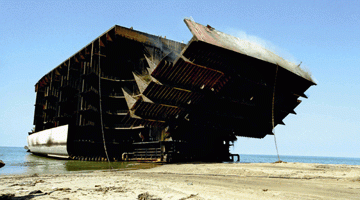
In a landmark decision that could shake up the ship recycling trades irrevocably, a judge in London has ruled that the Bangladeshi widow of a shipbreaker who fell to his death while working on an ex-Maran VLCC can sue the shipowner for negligence.
The High Court ruled that Maran (UK), part of the Angelicoussis shipping empire, arguably had a duty of care towards Mohammed Kalil Mollah, 32, who died in 2018 working on the Ekta VLCC.
Hamida Begum, Mollah’s widow, could be awarded up to £100,000 ($125,000) in damages if she wins her next trial.
If shipping companies send their vessels to Bangladesh or India or Pakistan to be broken up, there’s a potential liability towards shipbreaking workers who are injured or die while breaking up their vessel
“If Maran (UK) Ltd is made to accept that it owed Mr Mohammed Kalil Mollah a duty of care, maybe that will go some way to making UK shipping companies think twice about accepting greater financial reward for their end-of-life vessels at the cost of the environment and the lives of south Asian workers,” said Oliver Holland, a partner at Leigh Day, the law firm representing Begum.
“This has wider significance because it is saying that any UK shipping company, if they send their vessels to Bangladesh or India or Pakistan to be broken up, there’s a potential liability towards shipbreaking workers who are injured or die while breaking up their vessel,” Holland added.
Maran (UK) had argued during the hearing that it was not responsible for the operations at the shipbreaking yard, and that it was not the owner of the ship at the time it was beached in Bangladesh having sold it for demo to Wirana Shipping Corporation in September 2017, while also pointing out that around 70% of all ships end up on the beaches of south Asia.
“The companies are set up by creating post box companies, sometimes in the Caribbean, that own these vessels and when they sell them to Bangladesh they don’t sell them directly but sell them to cash buyers who hold them for a few weeks and then send them to south Asia,” Leigh Day’s Holland said.
Mollah had previously broken an arm and a leg in another accident at the demo yard prior to his death.
Despite considerable improvements in working conditions at many yards in south Asia over the last decade, shipbreaking remains an incredibly dangerous form of employment. Last year, at least 23 workers were killed and a further 75 badly injured in accidents at Bangladeshi shipbreaking yards.
The 1995-built Ekta traded under a number of names during its lifetime and will go down in history as one of the more famous VLCCs, not just for this shipbreaking ruling. Late in 2009, when fully laden and bound for New Orleans, it was captured by Somali pirates resulting in the largest ever reported ransom payment paid to pirates, totalling $9m paid by airdrop and cash transfer.

I have reviewed the case from a legal point of view (particularly: private international law) here https://bit.ly/3ftkEEm
This judgment was only a preliminary judgment, essentially holding that claimant’s arguments do not seem mad at first sight. However there is a lot of scope for discussion on how the first instance judge ruled. The case will now go to full trial, with the legal issues discussed in more depth. After that, appeal beckons.